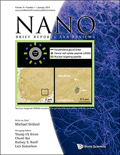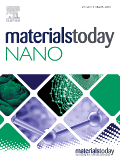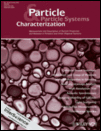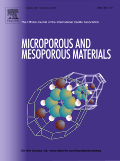
Nanoscale Research Letters
metrics 2024
Unlocking the potential of nanotechnology.
Introduction
Nanoscale Research Letters, published by SPRINGER, is a leading open-access journal dedicated to the rapid dissemination of innovative research in the field of nanoscience and nanotechnology. Established in 2006, this journal provides researchers and professionals with a platform to share their groundbreaking findings across a broad spectrum of applications, including condensed matter physics and materials science. With an impressive Q1 ranking in both Condensed Matter Physics and Materials Science categories as of 2023, it asserts its position as a top-tier publication within the scientific community, bolstered by a 96th percentile rank in the Scopus database. Nanoscale Research Letters not only emphasizes the importance of nanotechnology research but also ensures that its findings are widely accessible, adhering to its open-access mandate. Scholars and students alike are encouraged to contribute to and engage with this dynamic resource, fostering collaboration and innovation in the ever-evolving world of nanoscience.
Metrics 2024
 1.02
1.02 5.50
5.50 5.50
5.50 147
147Metrics History
Rank 2024
Scopus
IF (Web Of Science)
JCI (Web Of Science)
Quartile History
Similar Journals

Nanomaterials
Navigating the Cutting Edge of Nanomaterials ResearchNanomaterials, published by MDPI in Switzerland, stands as a leading platform in the realm of materials science and chemical engineering. Since its inception in 2011, this Open Access journal has garnered significant attention, reflected in its impressive rankings—placing in the Q1 category for Chemical Engineering and Q2 for Materials Science as per the 2023 quartiles. The journal consistently fosters innovation and interdisciplinary research through its rigorous peer-reviewed articles, inviting submissions that span a wide range of topics from nanostructured materials to advanced engineering techniques. With a commendable Scopus rank—#44 in Chemical Engineering and #93 in Materials Science, both within the top percentiles—Nanomaterials serves as an essential resource for researchers, professionals, and students eager to stay abreast of developments in this rapidly evolving field. Since its establishment, it has distinctively contributed to the academic community by facilitating insightful knowledge exchange and promoting high-quality research around nanoscale materials.

Inorganic and Nano-Metal Chemistry
Unveiling Breakthroughs in Nano-Metal Applications.Inorganic and Nano-Metal Chemistry is a premier journal published by Taylor & Francis Inc, focusing on innovative research and advancements in the fields of inorganic chemistry and nano-metal applications. With an increasing impact in the academic community, this journal has established itself within the Q3 category of both Inorganic Chemistry and Physical and Theoretical Chemistry as of 2023, reflecting its global recognition and influence. The journal is accessible as an Open Access publication, ensuring that research findings are freely available to a broad audience, promoting transparency and collaboration in scientific exploration. Based in the United Kingdom, Inorganic and Nano-Metal Chemistry aims to disseminate high-quality peer-reviewed articles that not only highlight fundamental studies but also push the boundaries of technological applications in areas such as catalysis, materials science, and nanotechnology. Researchers, professionals, and students will find this journal an invaluable resource for the latest developments and interdisciplinary insights in the ever-evolving landscape of inorganic and nano-metal chemistry.

ACS Nanoscience Au
Pioneering Research in NanomaterialsACS Nanoscience Au, published by the American Chemical Society, is a leading open-access journal dedicated to the rapidly evolving field of nanoscience. Since its inception in 2021, this journal has established itself within the top quartiles of academic publishing, ranking Q1 in both Chemistry and Materials Science for 2023. With a commitment to disseminating high-quality research, it provides a platform for innovative findings in nanomaterials, nanotechnology applications, and associated interdisciplinary studies. The journal is based in the United States and embraces an open-access model, ensuring that research is freely accessible to a global audience. This initiative not only enhances the visibility of authors' work but also facilitates collaboration across scientific domains. As a vital resource for researchers, professionals, and students alike, ACS Nanoscience Au plays a crucial role in advancing knowledge in the nanoscience community.

NANO
Shaping the Future of Nanoscience and TechnologyNANO is an esteemed academic journal published by World Scientific Publishing Co. Pte Ltd, focusing on the frontier of nanoscience and nanotechnology. With ISSN 1793-2920 and E-ISSN 1793-7094, this journal has been a pivotal platform for disseminating innovative research from 2008 to 2024. Located in Singapore, NANO has established itself within the academic community, currently holding notable rankings in the Q3 Category for both Condensed Matter Physics and Materials Science, as well as a Q4 Category status in Nanoscience and Nanotechnology. Though it operates under a non-open access model, its contributions are invaluable for researchers, professionals, and students seeking to stay abreast of the latest advancements and interdisciplinary approaches within the nanoscale domain. By providing in-depth articles, reviews, and insights, NANO plays a significant role in advancing our understanding of materials at the nanoscale, thereby fostering innovation and collaboration across related fields.

International Journal of Nano Dimension
Catalyzing breakthroughs in nanotechnology applications.The International Journal of Nano Dimension is a premier publication dedicated to advancing the field of nanotechnology and its applications across various disciplines, published by the Islamic Azad University, Tonekabon Branch. With an ISSN of 2008-8868 and an E-ISSN of 2228-5059, this journal serves as a vital platform for researchers, professionals, and students seeking to disseminate and access cutting-edge findings in nano materials and their integration into science and engineering. The journal has gained notable recognition in Scopus rankings, especially within the fields of Materials Science and Chemical Engineering, emphasizing its commitment to high-quality research. Spanning the years from 2019 to 2024, the journal emphasizes open access to foster knowledge sharing in the scientific community. As nanotechnology continues to revolutionize industries, the International Journal of Nano Dimension plays an essential role in showcasing transformative research that addresses the challenges and opportunities of this dynamic field.

Discover Nano
Connecting Ideas, Shaping the Future of NanoscienceDiscover Nano is a pioneering journal published by SPRINGER, dedicated to the rapidly evolving field of nanoscience and nanotechnology. Established in 2023, this innovative platform provides an open-access forum for researchers, professionals, and students to share and disseminate cutting-edge findings in materials science and condensed matter physics. With its commitment to accessibility, Discover Nano encourages a broad spectrum of contributions, aiming to foster collaboration and stimulate discussion in this dynamic area of study. As a new entry into the academic community, the journal holds great potential for growth, aspiring to increase its visibility and impact in the materials science arena, where it currently ranks in the bottom quartile for both materials science and physics categories. Based in Germany and reaching a global audience, Discover Nano represents a significant opportunity for those looking to shape the future of nanotechnology through impactful research and interdisciplinary dialogue.

Nano Futures
Innovating at the Atomic Level for Real-World ImpactNano Futures, published by IOP Publishing Ltd, is an influential journal dedicated to advancing the field of nanoscale science and technology, encompassing a wide range of disciplines such as Atomic and Molecular Physics, Bioengineering, and Materials Science. With a growing impact within the academic community, this journal has achieved a notable Q2 classification in categories like Chemistry and Electrical Engineering, making it a critical resource for researchers, professionals, and students seeking to explore innovative advancements in nanotechnology. Established in 2017 and operating through 2024, Nano Futures provides open access options for readers, ensuring wider dissemination and engagement with cutting-edge research findings. The journal's commitment to showcasing high-quality research makes it an essential channel for exploring the intersection of nanoscale innovations and practical applications in various industries.

Materials Today Nano
Transforming Materials Science Through Cutting-Edge Nano ResearchMaterials Today Nano, published by Elsevier, is a premier academic journal dedicated to the forefront of nano-materials research, encompassing innovations and advancements in biomaterials, condensed matter physics, electronic, optical, and magnetic materials, as well as materials chemistry. With an impressive Q1 ranking across multiple categories, including biomaterials and materials chemistry, this journal serves as a essential platform for researchers, professionals, and students aiming to contribute to and stay informed on cutting-edge developments that push the boundaries of materials science. Its open access model allows for wider dissemination of high-impact findings, ensuring that the research reaches a global audience. Operating from the United Kingdom, Materials Today Nano plays a vital role in fostering interdisciplinary collaboration and advancing scientific understanding in this rapidly evolving field.

PARTICLE & PARTICLE SYSTEMS CHARACTERIZATION
Fostering Collaboration in Particle ResearchPARTICLE & PARTICLE SYSTEMS CHARACTERIZATION is a distinguished journal dedicated to advancing the knowledge within the fields of Chemistry, Condensed Matter Physics, and Materials Science. Published by WILEY-V C H VERLAG GMBH in Germany, this journal has established a solid reputation since its inception in 1984, showcasing research aimed at understanding the intricate properties and behaviors of particulate systems. With an impressive Q2 ranking in its respective categories and Scopus ranks indicating a robust standing in the global research community, it serves as an essential resource for researchers, professionals, and students. Although it does not currently offer Open Access options, its comprehensive articles and reviews provide valuable insights that contribute significantly to the ongoing discourse in these scientific domains. As it prepares to celebrate four decades of publication, PARTICLE & PARTICLE SYSTEMS CHARACTERIZATION continues to provide a vital platform for emerging knowledge, fostering innovation and collaboration among scientists dedicated to the study of particle systems.

Microporous and Mesoporous Materials
Connecting Researchers in the World of Microporous MaterialsMicroporous and Mesoporous Materials is a leading academic journal published by ELSEVIER, specializing in the field of porosity characterization and applications of microporous and mesoporous materials. With an impactful Q1 ranking in various categories, including Chemistry, Condensed Matter Physics, and Materials Science, this journal serves as a vital resource for researchers, professionals, and students focused on advancing the understanding and application of these materials. Established in 1998 and set to continue its influence until 2024, the journal's rigorous peer-review process ensures the dissemination of high-quality research findings. Additionally, its commitment to open access publishing broadens accessibility, fostering an inclusive community dedicated to innovation in nanoscience, materials physics, and engineering. The journal's Scopus rankings highlight its prestigious standing, placing it among the top percentile within pertinent fields. For those engaged in cutting-edge research or education within these sectors, Microporous and Mesoporous Materials remains an essential journal for current advancements and insights.